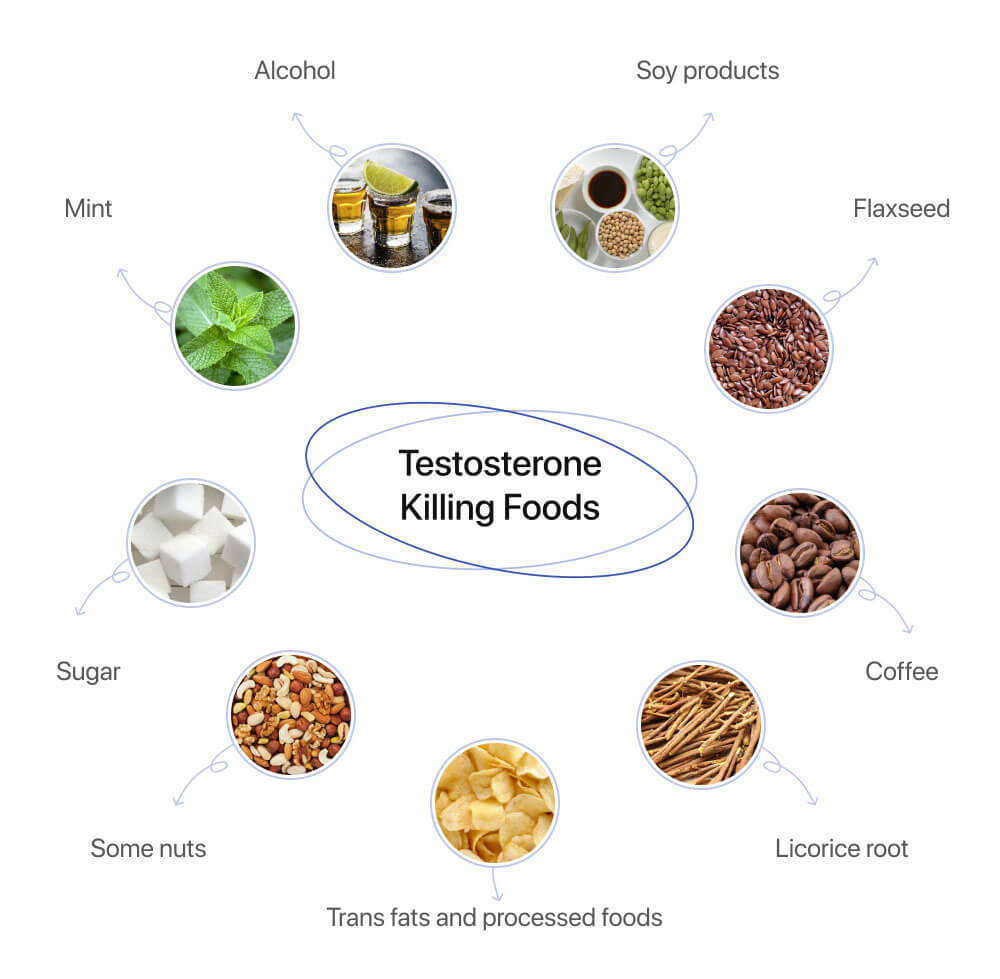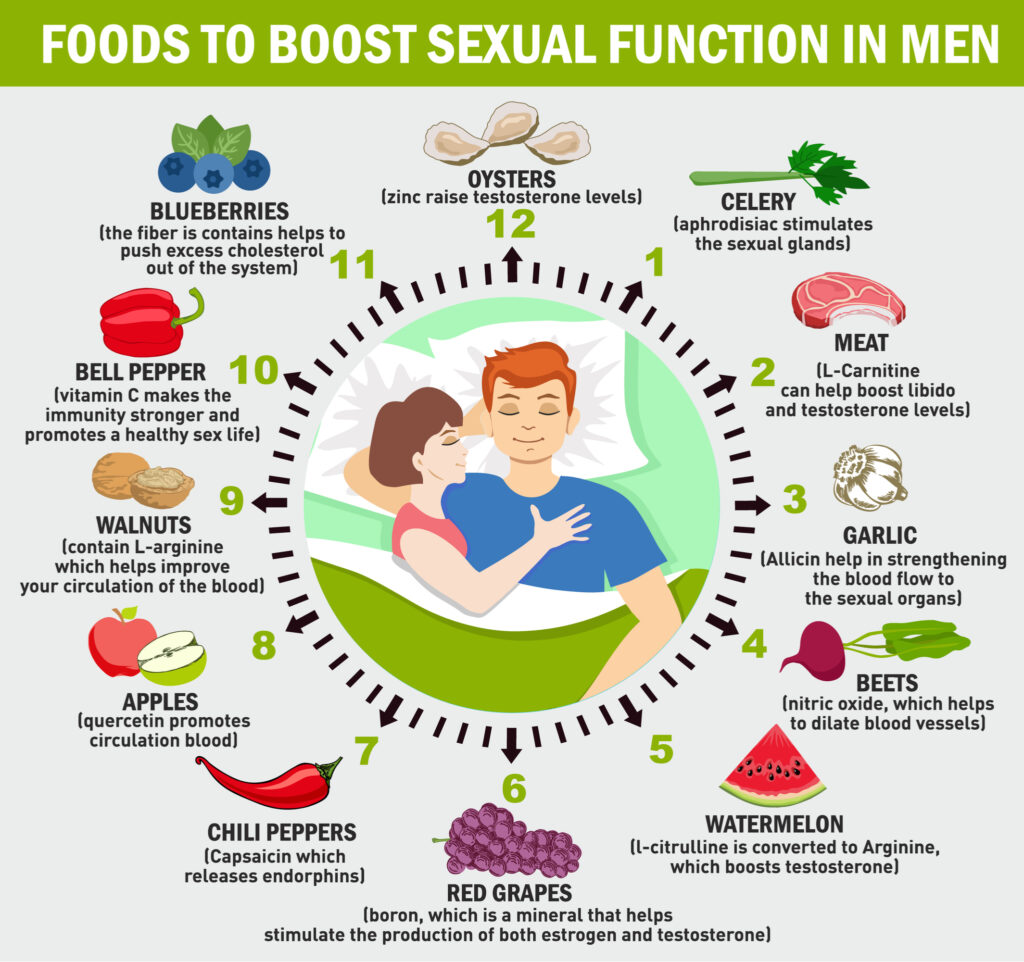Testosterone killing foods: a hidden danger lurking in our diets. Join us as we unveil the foods that can wreak havoc on your testosterone levels, exploring the science behind their impact and empowering you with knowledge to make informed choices for optimal hormonal health.
From processed meats to sugary treats, we’ll shed light on the mechanisms by which these foods sabotage testosterone production, leaving you feeling sluggish, unmotivated, and below your peak.
Foods Impacting Testosterone Levels

Certain foods can influence testosterone levels, either by boosting or reducing its production. Understanding these effects can help individuals make informed dietary choices to optimize their testosterone levels.
Some foods have been associated with lowering testosterone levels, primarily due to the presence of certain compounds that interfere with testosterone production or metabolism.
Soy-based Foods
- Soy contains isoflavones, which are plant compounds that mimic the structure of estrogen, the female sex hormone.
- Estrogen and testosterone have opposing effects, and an increase in estrogen levels can lead to a decrease in testosterone production.
Licorice Root
- Licorice root contains glycyrrhizin, a compound that inhibits the enzyme 11-beta-hydroxysteroid dehydrogenase type 1 (11β-HSD1).
- 11β-HSD1 is responsible for converting inactive cortisone to active cortisol, a stress hormone that can suppress testosterone production.
Mint
- Mint contains menthol, a compound that has been shown to reduce testosterone levels in some studies.
- The exact mechanism is not fully understood, but it may involve an interference with testosterone metabolism or signaling pathways.
Alcohol
- Excessive alcohol consumption can impair testosterone production by damaging the Leydig cells in the testes, which are responsible for testosterone synthesis.
- Chronic alcohol use can also lead to hormonal imbalances and a decrease in testosterone levels.
Processed Foods
- Processed foods often contain high amounts of saturated and trans fats, which can interfere with testosterone production.
- These fats can increase inflammation, which can disrupt the hormonal balance and lead to a decrease in testosterone levels.
Plant-Based Alternatives: Testosterone Killing Foods
Plant-based foods can be an excellent source of nutrients that support testosterone production. These foods are rich in essential vitamins, minerals, and antioxidants that play a crucial role in maintaining healthy testosterone levels.
Legumes
Legumes, such as beans, lentils, and peas, are packed with protein, fiber, and zinc. Zinc is a vital mineral involved in testosterone synthesis. Studies have shown that zinc supplementation can increase testosterone levels in men with zinc deficiency.
Nuts and Seeds
Nuts and seeds, like almonds, walnuts, and pumpkin seeds, are rich in healthy fats, protein, and zinc. They also contain phytosterols, plant compounds that have been shown to block the conversion of testosterone to estrogen.
Whole Grains, Testosterone killing foods
Whole grains, such as brown rice, quinoa, and oats, provide complex carbohydrates, fiber, and B vitamins. B vitamins, particularly vitamin B6, are essential for testosterone production.
Fruits and Vegetables
Fruits and vegetables, especially those rich in antioxidants, can help protect against oxidative stress, which can damage testosterone-producing cells. Berries, citrus fruits, and leafy greens are excellent sources of antioxidants.
Avoiding foods that diminish testosterone is crucial for maintaining optimal levels. Supermarkets like key food supermarkets offer a wide selection of healthy alternatives that support testosterone production. By making informed choices, we can safeguard our testosterone levels and reap the benefits it brings.
Lifestyle Factors
Your lifestyle choices can significantly influence your testosterone levels. Understanding how stress and sleep affect testosterone production can help you optimize your hormone levels naturally.
Stress Management
Chronic stress can suppress testosterone production. When you’re stressed, your body releases cortisol, a hormone that can interfere with testosterone synthesis. To manage stress, try relaxation techniques such as meditation, yoga, or deep breathing exercises.
Sleep Optimization
Sleep is essential for testosterone production. During sleep, your body releases growth hormone, which stimulates testosterone production. Aim for 7-9 hours of quality sleep each night to ensure optimal testosterone levels.
Medical Conditions

Various medical conditions can contribute to low testosterone levels, leading to a range of symptoms and potential health implications. Understanding these conditions and their associated symptoms is crucial for effective diagnosis and treatment.
Some of the most common medical conditions associated with low testosterone include:
Klinefelter Syndrome
Klinefelter syndrome is a genetic condition where males are born with an extra X chromosome. This results in reduced testosterone production and can lead to symptoms such as infertility, gynecomastia (breast enlargement), and learning difficulties.
Pituitary Disorders
The pituitary gland plays a crucial role in hormone production, including testosterone. Disorders affecting the pituitary gland, such as pituitary tumors or head injuries, can disrupt testosterone production and lead to symptoms such as erectile dysfunction, low libido, and fatigue.
Testicular Disorders
Conditions affecting the testicles, such as undescended testicles, testicular torsion, or infections, can impair testosterone production. Symptoms may include pain, swelling, or changes in testicular size.
Chronic Illnesses
Certain chronic illnesses, such as kidney disease, liver disease, or diabetes, can affect testosterone production as a secondary effect. Symptoms vary depending on the underlying illness.
Treatment Options
Treatment for low testosterone due to medical conditions typically involves addressing the underlying cause. This may include hormone replacement therapy, surgery, or medications to manage the associated symptoms.
Supplements and Medications

Supplements and medications can significantly impact testosterone levels. Understanding their effects is crucial for maintaining optimal hormone balance.
Supplements
Various supplements have been shown to influence testosterone production. These include:
D-Aspartic Acid
An amino acid that stimulates testosterone synthesis in the testes.
Tribulus Terrestris
An herb that may increase testosterone levels by enhancing luteinizing hormone (LH) production.
Fenugreek
A herb that contains compounds that can increase free testosterone levels.While these supplements may offer potential benefits, it’s important to note that their effectiveness and safety can vary widely. Consult with a healthcare professional before using any supplements to avoid potential risks or interactions.
Medications
Certain medications can also affect testosterone levels. These include:
Anabolic Steroids
Synthetic hormones that can dramatically increase testosterone levels. However, they come with significant side effects and should only be used under strict medical supervision.
Opioid Painkillers
Chronic use of opioid painkillers can suppress testosterone production.
Chemotherapy Drugs
Some chemotherapy drugs can damage the testes and reduce testosterone levels.Understanding the impact of medications on testosterone levels is essential for managing potential hormone imbalances and making informed healthcare decisions.
Concluding Remarks
In conclusion, understanding testosterone killing foods is crucial for maintaining hormonal balance and overall well-being. By making mindful choices about our diet and lifestyle, we can empower ourselves to optimize testosterone levels, boost our energy, and live healthier, more fulfilling lives.
